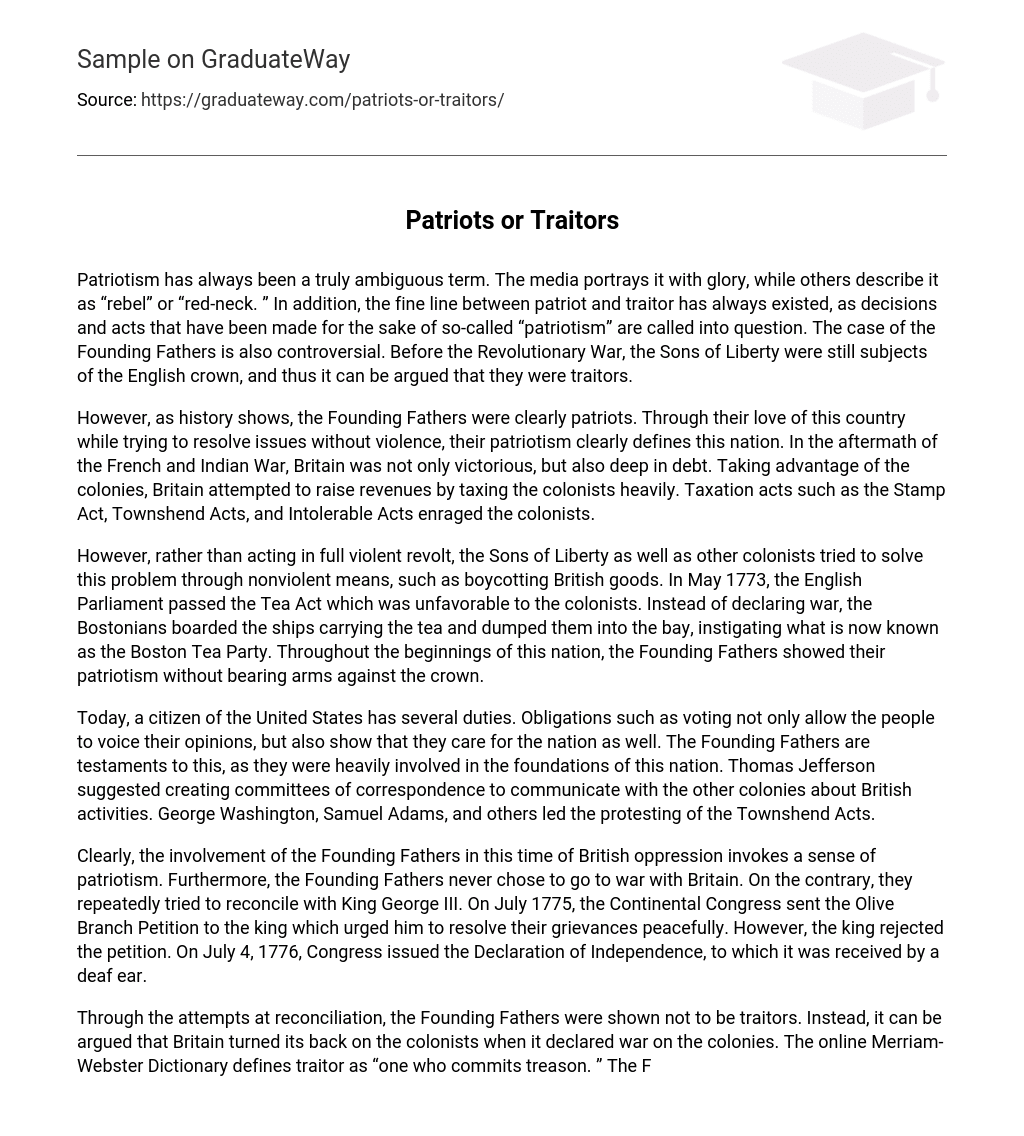Patriotism has always been a truly ambiguous term. The media portrays it with glory, while others describe it as “rebel” or “red-neck. ” In addition, the fine line between patriot and traitor has always existed, as decisions and acts that have been made for the sake of so-called “patriotism” are called into question. The case of the Founding Fathers is also controversial. Before the Revolutionary War, the Sons of Liberty were still subjects of the English crown, and thus it can be argued that they were traitors.
However, as history shows, the Founding Fathers were clearly patriots. Through their love of this country while trying to resolve issues without violence, their patriotism clearly defines this nation. In the aftermath of the French and Indian War, Britain was not only victorious, but also deep in debt. Taking advantage of the colonies, Britain attempted to raise revenues by taxing the colonists heavily. Taxation acts such as the Stamp Act, Townshend Acts, and Intolerable Acts enraged the colonists.
However, rather than acting in full violent revolt, the Sons of Liberty as well as other colonists tried to solve this problem through nonviolent means, such as boycotting British goods. In May 1773, the English Parliament passed the Tea Act which was unfavorable to the colonists. Instead of declaring war, the Bostonians boarded the ships carrying the tea and dumped them into the bay, instigating what is now known as the Boston Tea Party. Throughout the beginnings of this nation, the Founding Fathers showed their patriotism without bearing arms against the crown.
Today, a citizen of the United States has several duties. Obligations such as voting not only allow the people to voice their opinions, but also show that they care for the nation as well. The Founding Fathers are testaments to this, as they were heavily involved in the foundations of this nation. Thomas Jefferson suggested creating committees of correspondence to communicate with the other colonies about British activities. George Washington, Samuel Adams, and others led the protesting of the Townshend Acts.
Clearly, the involvement of the Founding Fathers in this time of British oppression invokes a sense of patriotism. Furthermore, the Founding Fathers never chose to go to war with Britain. On the contrary, they repeatedly tried to reconcile with King George III. On July 1775, the Continental Congress sent the Olive Branch Petition to the king which urged him to resolve their grievances peacefully. However, the king rejected the petition. On July 4, 1776, Congress issued the Declaration of Independence, to which it was received by a deaf ear.
Through the attempts at reconciliation, the Founding Fathers were shown not to be traitors. Instead, it can be argued that Britain turned its back on the colonists when it declared war on the colonies. The online Merriam-Webster Dictionary defines traitor as “one who commits treason. ” The Founding Fathers never committed this act. They resorted to nonviolent means for combating the taxes placed on them, they were heavily involved in the nation’s roots, and they attempted to reconcile with the king on several occasions.
Although one may argue that they committed treason when signing the Declaration of Independence, this is not the case. They had already previously tried to resolve conflicts with the king, but to no avail. Instead, the signing of the Declaration of Independence signifies their most patriotic act. If captured, the Founding Fathers would be deemed for an act they had not committed (treason) and would be hanged. Thus, the Founding Fathers literally put their lives on the line for this nation and are and have always been patriots.





